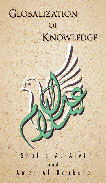"No religion per se advocates violence or terrorism; it is for some of its followers to do that for reasons known to them."

 |
Globalization of Knowledge:
Islam and its Contributions by Shafiq A. Alvi and Amer Al-Roubaie Trafford Publishing
book review by K.R. Mecom
The Islam religion has recently been put into the global spotlight due to terrible tragedies including the destruction of the World Trade Towers and other bombings such as those in London. Because of this spotlight, misconceptions and outright falsities about Islam have become prevalent. The purpose of Globalization of Knowledge is to remedy those misconceptions about Islam, paint a truer picture of the religion, and show "its enormous contributions to human knowledge and welfare."
The authors present a well-researched and factual overview of Islam. In a chapter entitled "Understanding Islam," the authors explain its philosophical foundation and describe in-depth the five tenants of the religion, which are not so different from other monotheistic religions and include prayer, fasting, and believing in God. Overall, the authors do a fine job of explaining what Islam is about to those who might not be overly familiar about the religion. However, the argument made about the role of women in Islam felt weaker and less supported than other arguments. The authors seem rather defensive and rather than explain why women are treated rather poorly in Islam, they point examples in other cultures of women being treated badly.
The most successful parts of the book are found in Part III, where the authors discuss what Islam has given back to the world. Through these last chapters, they trace the history of various Islamic scholars, scientists, authors, and artists that have made significant strides in their given fields. On the whole, this book serves a good resource for those who want to learn more about the Islamic religion. At times the language and syntax of the authors can be rather dense, but the book offers an informative, comprehensive view of a religion that most Westerners know little about.